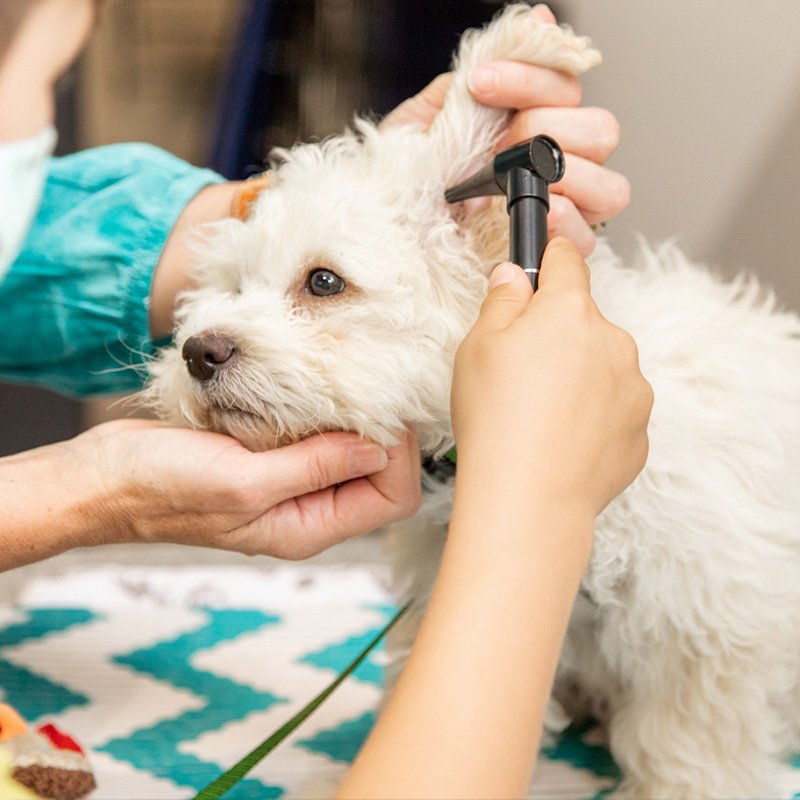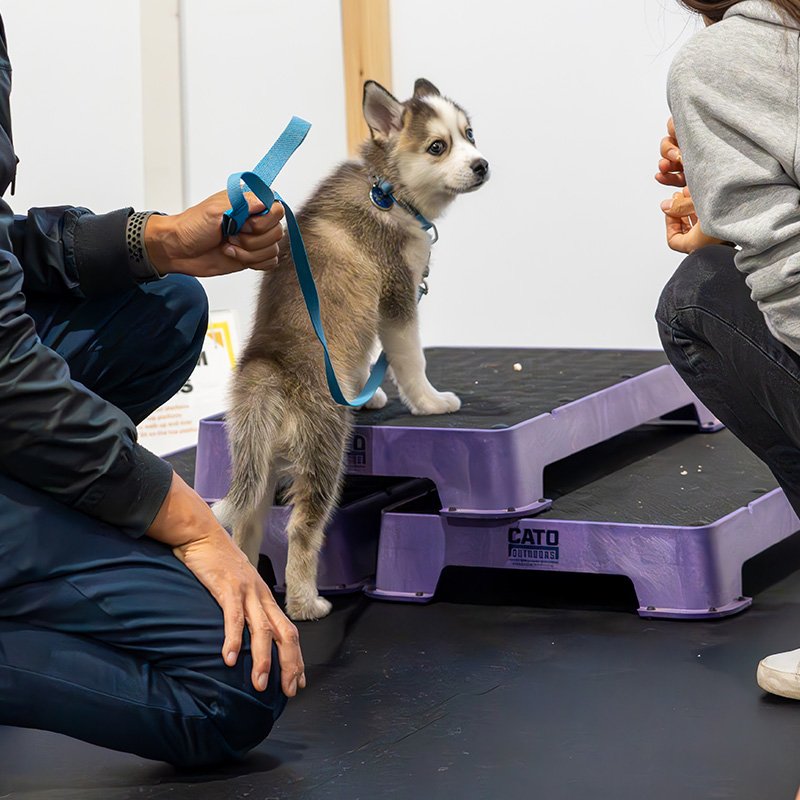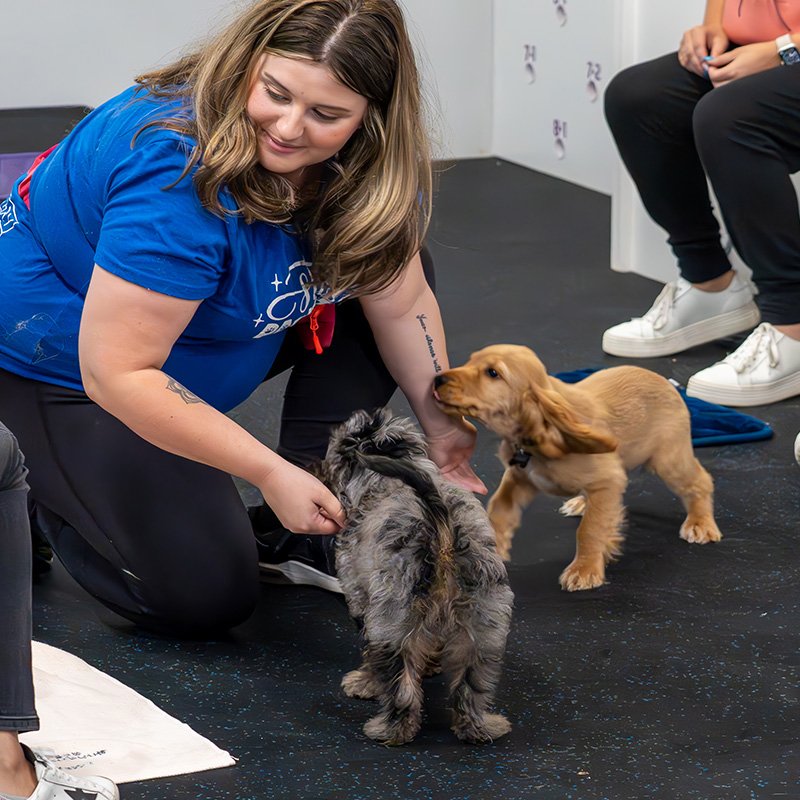Puppy Socialization Classes
for baby puppies: 8 – 16 weeks old
HOW OUR CLASSES WORK
PUPPY 101 + PUPPY ELEMENTS
We offer our orientation information online so that families can start attending in person classes as soon as possible. No waiting for the next term to start. Enrollment is on-going so that families have the best chance to get started before they miss the limited socialization window.
Puppy 101
Enroll in our online Puppy 101 class as part of our “4 Elements” package or as a standalone course.
Puppy Elements
Register for in-person socialization classes and attend once a week for 4 weeks.
Complete Puppy 101
Before your first in-person Elements class complete the pre-requisites in the online Puppy 101 course
socialization class content rotates weekly
4 Unique Elements CLASSes

FIRE

Earth

Air

Water
There is no set start date or terms for socialization class and intake is on-going.
Puppies should be 12 weeks or younger on the date of their first class.
KNOW BEFORE YOU SIGN UP
CLASS REQUIREMENTS
Online Orientation
The Introduction & Socialization units from our online Puppy 101 course must be completed before families attend their first in-person class.
8 - 12 Weeks
Puppies must be between 8 and 12 weeks on the date of their first class to attend socialization classes.
Puppy 101
Required Online Course- Topics covered:
- • Introduction to Puppy Raising
- • Socialization
- • Potty Training
- • Puppy Biting
- all families must complete the Introduction and Socialization units and corresponding quizzes in Puppy 101 before permitted to attend Puppy Elements classes
- *this course is included with your purchase of 4 in-person socialization classes
4 Elements
Socialization Package- • Puppy 101 Enrollment ($25 value)
- • 4 Puppy Elements socialization classes (once a week for 4 weeks, choose your start date after purchase)
- only for puppies 12 weeks or younger at their first class
- Every class includes:
- • Settling
- • Off leash play and exploration time
- • Sound & object socialization
- • Handling exercise
- • Equipment & surface socialization
- • Confidence building activities
Frequently Asked Questions.
Have questions? Please check our FAQs before sending us an email!
What day/time are Puppy Elements classes?
How old should my puppy be when I start classes?
9 – 11 weeks old
Puppies may attend in person socialization classes as early as 1 week past their first vaccinations. If you just brought your puppy home we recommend letting them have about a week to settle into their new home. Puppies typically are placed in their homes around 8 or 9 weeks, so that means 9 or 10 weeks is the typical age we recommend to start.
Puppies must be 12 weeks or younger at their first class.
My puppy is already 13 weeks old . . . can I still attend classes?
No
Puppy Elements socialization classes are designed for puppies in their socialization stage of development which ends between 12 – 16 weeks, which means puppies must start their first of the 4 classes no more than 12 weeks old. Not only do older puppies benefit considerably less from the activities in our Puppy Elements classes, but they can also compromise the experience for our youngest puppies.
We prefer puppies in the class to start at 9 or 10 weeks old, but give a little wiggle room to allow puppies to start up to 12 weeks old.
What vaccinations does my puppy need to have to attend class?
1st set of vaccinations
Puppies must have received their first set of vaccinations a minimum of one week prior to their first class. This first vaccination is a parvo/distemper combination vaccine. Puppies typically do not receive their rabies vaccination until 16 weeks or older, so rabies vaccination is not required for socialization classes.
Note that vaccinations must have been administered by a veterinarian. We cannot accept vaccinations that a breeder or a rescue administered (unless given by a DVM).
If your puppy has been imported from outside North America we also require to see a health certificate signed by a veterinarian since your puppy has arrived to Canada.
Why do you not accept vaccinations given by a breeder or rescue? While we understand that some breeders or rescues may be qualified to administer vaccines neither breeders not rescues are regulated nor are they typically trained in the storing and administration of vaccines. If vaccines are not carefully stored/handled they may become ineffective. Furthermore, many breeders and rescues that administer vaccines themselves do so to cut corners and may also be making other compromises to a puppy’s health. Unfortunately, we do not have the time to research every individual breeder or rescue to determine if your specific puppy came from a reliable and qualified source or not.
We are not willing to take risks when it comes to the health of all our puppies in attendance at class and so we reserve the right to only accept vaccinations from veterinarians.
Is it safe to attend classes before my puppy has been fully vaccinated?
Yes.
With developing puppies we need to balance health risks with behaviour risks.
The Extraordinary Canines’ training facility is disinfected with a veterinary grade cleaner that is effective against common diseases, including canine parvovirus, before every Puppy Elements class and all families must provide proof that their puppy has received, at minimum, one set of vaccinations and has been seen by a veterinarian.
While the risk of attending a group puppy class are not zero, if the proper precautions are taken there is no greater risk than taking your puppy to the vet.
While your vet will disinfect the exam room before your unvaccinated puppy enters, your puppy may also be at risk of being exposed to disease visiting a vet hosptial/clinic as sick and potentially infectious patients regularly visit veterinary offices. On the other hand, Extraordinary Canines does not allow dogs showing any signs of potentially infectious illness to attend classes. The point here is not to worry you about visiting the vet, but simply to illustrate that there may be some health risks associated to things that benefit your puppy’s health and well-being.
The primary socialization window in puppies is between 3 – 12 weeks old and if we wait until puppies have received all their vaccinations at 16 weeks old we will have missed that very limited opportunity.
Puppies that are not adequately and ongoingly socialized before 12 weeks old are at higher risk of developing behaviour issues like fear/anxiety/aggression and also being relinquished to a rescue or shelter. A reputable rescue or breeder will have already begun socialization.
The most common cause of death in dogs under the age of 2 is behaviour euthanasia not disease. So, while we absolutely need to be careful with our puppies before they are fully vaccinated we also need to ensure they are getting socialization opportunities in safe environments to mitigate risks of behavioural problems as much as possible.
Extraordinary Canines follows the latest evidence on puppy socialization and development as well as the recommendations from The American Veterinary Society of Animal Behavior (AVSAB) on puppy socialization classes which is to start puppies with socialization classes as early as it is safe to do so: one week after their first vaccinations.
High risk areas for disease must be avoided with your puppy until they are fully vaccinated (~16 weeks old). High risk areas include the dog park, dog daycare, the ground at the pet store, common areas at the vet office, and any other areas frequented by unknown dogs.
Ideally your puppy should start classes before 12 weeks. The puppies that start classes at 9 or 10 weeks old usually benefit most from classes compared to puppies that start later. Puppies that do not start classes until after 12 weeks old typically have a much more challenging time participating in the various socialization activities in our Puppy Elements classes and may have already begun to develop some fear and anxiety which is why we require puppies to start classes by 12 weeks old.
Read the full Puppy Socialization Position Statement from the AVSAB to learn more.
How many puppies are in a class? How many instructors?
Class sizes vary week to week with our “start anytime” approach. We run classes with as few as 2 puppies and as many as 6 puppies.
We ensure that there is at least one trainer available for every 3 puppies and their families in attendance so that there’s plenty of individual attention.
Do I need to finish the Puppy 101 lesson before I register for socialization class?
Families will have access to register their puppy in socialization classes as soon as they enroll in Puppy 101.
That means you can book your socialization classes before you complete the pre-requisites, BUT the requirements to complete the Puppy 101 Intro and Socialization units do need to be met before you attend your first in-person puppy socialization class. This is strictly enforced as families that have not understood the required Puppy 101 lessons typically require a disproportionate amount of help and attention from our trainers.
We check that any new families booked in have passed their Puppy 101 Introduction Quiz and Socialization Quiz when we are setting up for the day’s Elements class. Families that have not completed the Puppy 101 pre-requisite will be turned away without refund.
Will my puppy learn skills like "Sit", "Down", and "Come"?
No.
The priority for our baby puppies is to have positive socialization experiences. There is only so much we can cover in a one hour class, so we wait to teach skills like “Sit” and “Down” until our Foundations classes.
Most families are very busy, so if you only have 20 or 30 minutes to spend on training in a day we really encourage that time is spent on handling, sound and object socialization, and other socialization experiences like “Puppy Picnics” (we talk about this stuff in our Puppy 101 course). The benefits of these activities are supercharged in puppies under 16 weeks old and acceptance and excitement for these things cannot be as easily earned in dogs over 4 months old.
A dog can learn behaviours like “Sit”, “Down”, “Come”, and “Leave It” at absolutely any age and it can even be easier to work on these things when puppies are at least 4 months old and have a longer attention span. That said, some families have a lot of extra time to spend with their puppies and can spend 20 – 30 minutes a day on handling and other socialization activities plus still have additional time to work with their new addition. If this is your situation then we encourage you to enrol in our online Foundations course to get started on those skills and more.
How much time will my puppy spend playing with other puppies? What does play time look like?
We give puppies two off leash exploration opportunities during our classes. While each class can vary slightly in precise timing about 20 minutes total is spent off leash.
Not all puppies want to play with other puppies. This is normal. Off leash time doesn’t mean every puppy will choose to play during this time. We aim to ensure your puppy can make the choice to play or not based on their temperament and comfort level.
During off leash time our skilled trainers will supervise interactions between puppies that are interested in playing with others.
Larger classes are typically divided into two play groups where we try to match them with puppies that are of similar size and energy as much as possible.
For puppies that are not ready to play yet or simply are not interested in play we aim to protect their confidence by ensuring they do not become overwhelmed. Most puppies become more interested in play as they attend more classes. It’s common for puppies to choose to watch the others instead of directly interact in their first class or two.
Forcing a puppy that is worried or hesitant about other dogs into play can foster aggressive behaviour towards other dogs and our goal is to always have a positive impact on your puppies development.
How many people can attend with the puppy? Can I bring my children?
We encourage attendance from two members of your household or help from a friend; this allows one person to be able to follow instruction if the other is distracted while attending to the puppy.
Children in attendance should be mature enough to sit quietly and attentively during the full one hour class. They should be old and mature enough that their attendance is helpful in training the puppy and does not distract from the puppy training.
Children under 10 years old should be left at home if possible, but are required to have an additional adult who is not responsible for the puppy available to take responsibility for them if they do attend.
No more than 4 humans per puppy may attend. An adult must be present at all classes.
What do the "Elements" (Fire, Water, etc) mean?
The Elements themes of our classes are only very loosely tied into the content of each socialization class.
Mostly each themed week is simply a way for us to keep track of which curriculum we are teaching from week to week in a way that is not numbered so that families don’t feel that there’s a certain week that’s ideal to start (the best time to start is 1 week past your puppy’s first vaccines and 1 week after they’ve been home).
We do have loose tie-ins to the Element each week like socializing to the sounds of Fireworks during “Fire” class and exposing puppies to Umbrellas during “Water” class.
Puppy Classes in Action







